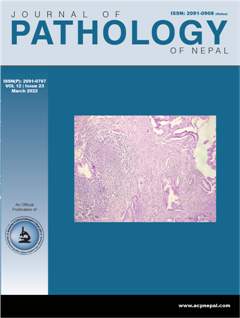Mucinous lesions of the appendix: a histopathological study
DOI:
https://doi.org/10.3126/jpn.v12i1.39338Keywords:
Appendix, Mimics, Mucinous neoplasmsAbstract
Background: Mucinous lesions of the appendix are frequently misinterpreted in histopathological examination due to their relative rarity. Our study focuses on interpreting the histopathological spectrum of such lesions and understanding the disease burden of appendiceal mucinous lesions in a tertiary centre.
Materials and Methods: This was a retrospective cross-sectional study conducted in the Department of Pathology. Gross and microscopic findings of appendicectomy specimens with mucinous lesions were analysed and classified according to the latest WHO 2019 recommendation.
Results: Seven hundred and forty appendicectomy specimens were received during the study period out of which nine appendix (1.2%) had mucinous lesions. Five (55.6%) of these lesions had a mucinous neoplasm while four of them (44.4%) were non-neoplastic. The most common lesion was low-grade appendiceal mucinous neoplasm (n=4; 44.4%). Two cases (22.2%) were retention cysts and there was one case each of mucinous adenocarcinoma, appendiceal diverticulosis, and endometriosis-associated mucinous metaplasia of the appendix. The mucinous neoplasms were significantly more common in females (80%). High-grade appendiceal mucinous neoplasms and serrated lesions or polyps weren’t seen in our study.
Conclusions: Mucinous lesions of the appendix are often incidental findings in patients operated for symptoms of acute appendicitis. Low-grade appendiceal mucinous neoplasms are the most common among them. Thorough knowledge of the neoplastic mimics and careful gross, as well as microscopic examination, is a must for proper diagnosis and staging since it has a significant impact on further patient management and prognostication.
Downloads
Downloads
Published
How to Cite
Issue
Section
License
Copyright (c) 2022 Oshan Shrestha, Dr. Reetu

This work is licensed under a Creative Commons Attribution 4.0 International License.
This license enables reusers to distribute, remix, adapt, and build upon the material in any medium or format, so long as attribution is given to the creator. The license allows for commercial use.




